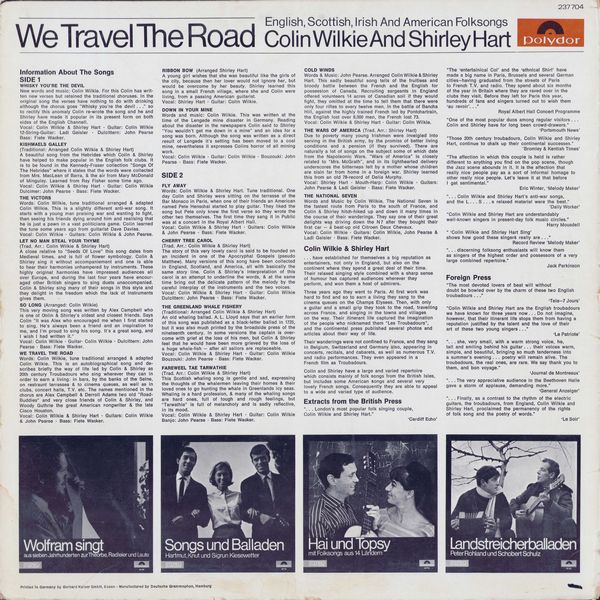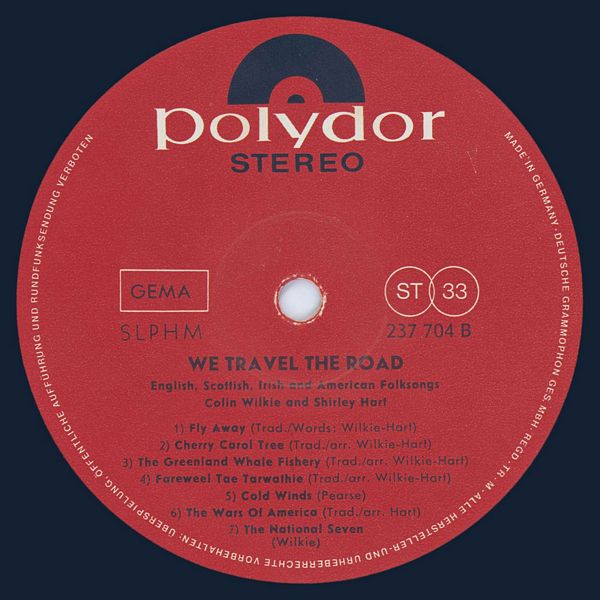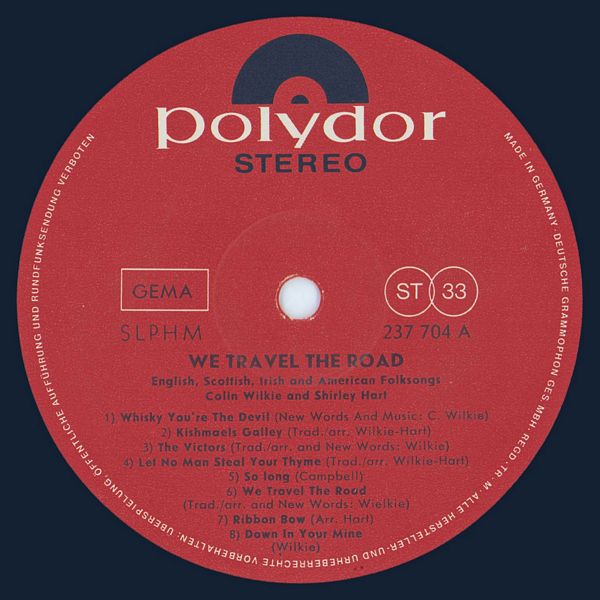

 |



|
Information About The Songs
Whisky You're The Devil — For this Colin has written new verses but retained the traditional choruses. In the original song the verses have nothing to do with drinking although the chorus goes "Whisky you're the devil … " so to rectify this anomaly Colin re-wrote the song and he and Shirley have made it popular in its present form on both sides of the English Channel.
Kishmaels Galley — A beautiful song from the Hebrides which Colin & Shirley have helped to make popular in the English folk clubs. It is to be found in the Kennedy-Fraser collection "Songs Of The Hebrides" where it states that the words were collected from Mrs. MacLean of Barra, & the air from Mary McDonald of Mingulay. Learned from Ray Fisher some time ago.
The Victors — This is a slightly different anti-war song. It starts with a young man praising war and wanting to fight, then seeing his friends dying around him and realising that he is just a pawn in a vast politicians game. Colin learned the tune some years ago from guitarist Dave Davies.
Let No Man Steal Your Thyme — A close relative to "Seeds Of Love" this song dates from Medieval times, and is full of flower symbology. Colin & Shirley sing it without accompaniment and one is able to hear their harmonies unhampered by instruments. These highly original harmonies have impressed audiences all over Europe, and during the last four years have encouraged other British singers to sing duets unaccompanied. Colin & Shirley sing many of their songs in this style and they delight in the freedom which the lack of instruments gives them.
So Long — This very moving song was written by Alex Campbell who is one of Colin & Shirley's oldest and closest friends. Says Colin "It was Alex who encouraged me when I first started to sing. He's always been a friend and an inspiration to me, and I'm proud to sing his song. It's a great song, and I wish I had written it."
We Travel The Road — This is an autobiographical song and describes briefly the way of life led by Colin & Shirley as 20th century Troubadours who sing wherever they can in order to earn a living: in bars, by the banks of the Seine, on restaurant terraces & to cinema queues, as well as in clubs, concert halls, T.V. etc. The names mentioned in the chorus are Alex Campbell & Derroll Adams two old "Road-Buddies" and very close friends of Colin & Shirley, and Woody Guthrie the great American songwriter & the late Cisco Houston.
Ribbon Bow — A young girl wishes that she was beautiful like the girls of the city, because then her lover would not ignore her, but would be overcome by her beauty. Shirley learned this song in a small French village, where she and Colin were living, from a passing American guitarist.
Down In Your Mine — This was written at the time of the Lengede mine disaster in Germany. Reading about the disaster in the newspapers Colin said to Shirley "You wouldn't get me down in a mine" and an idea for a song was born. Although the song was written as a direct result of Lengede it's setting has been moved to a coal mine, nevertheless it expresses Colins horror of all mining work.
Fly Away — One day Colin and Shirley were sitting on the terrace of the Bar Monaco in Paris, when one of their friends an American named Pete Henschal started to play guitar. They liked the song but Pete only knew the first verse so they wrote the other two themselves. The first time they sang it in Public was at a concert in the Royal Albert Hall.
Cherry Tree Carol — The story of this very lovely carol is said to be founded on an incident in one of the Apocryphal Gospels (, pseudo Matthew). Many versions of this song have been collected in England, Scotland, and America, all with basically the same story line. Colin & Shirley's interpretation of this carol is an attempt to underline the words, & at the same time bring out the delicate pattern of the melody by the careful interplay of the instruments and the two voices.
The Greenland Whale Fishery — An old whaling ballad. A. L. Lloyd says that an earlier form of this song was published as a black-letter ballad in 1725, but it was also much printed by the broadside press of the nineteenth century. In some versions the captain is overcome with grief at the loss of his men, but Colin & Shirley feel that he would have been more grieved by the loss of a huge whale-fish — after all sailors are replaceable.
Fareweel Tae Tarwathie — This Scottish whaling song is gentle and sad, expressing the thoughts of the whalermen leaving their homes & their loved ones to go hunting the whale in Greenlands icy seas. Whaling is a hard profession, & many of the whaling songs are hard ones, full of tough and rough feelings, but "Tarwathie" is full of melancholy and is sadly reflective, in its mood.
Cold Winds — This sadly beautiful song tells of the fruitless and bloody battle between the French and the English for possession of Canada. Recruiting sergeants in England offered volunteers 14 acres of Canadian soil if they would fight, they omitted at the time to tell them that there were only four rifles to every twelve men. In the battle of Bancha Hill, against the highly trained French led by Pontchartrain, the English lost over 8,000 men, the French lost 73.
The Wars Of America — Due to poverty many young Irishmen were inveigled into serving in the British army, by the promiss of better living conditions and a pension (, if they survived). There are naturally a lot of songs on the subject some of which date from the Napoleonic Wars. "Wars of America" is closely related to "Mrs. McGrath", and in its lighthearted delivery underscores the bitterness felt by a mother whose children are slain far from home in a foreign war. Shirley learned this from an old 78-record of Delia Murphy.
The National Seven — The National Seven is the fastest route from Paris to the south of France, and Colin & Shirley hitch-hiked up and down it many times in the course of their wanderings. They say one of their great delights was driving down the N7 after they bought their first car — a beat-up old Citroen Deux Chevaux.
Colin Wilkie & Shirley Hart
… have established for themselves a big reputation as entertainers, not only in England, but also on the continent where they spend a great deal of their time. Their relaxed singing style combined with a sharp sense of humour has captured audiences wherever they perform, and won them a host of admirers.
Three years ago they went to Paris. At first work was hard to find and so to earn a living they sang to the cinema queues on the Champs Elysees. Then, with only a guitar and a small grip they took to the road, travelling across France, and singing in the towns and villages on the way. Their itinerant life captured the imagination of the people who nicknamed them "Les Troubadours", and the continental press published several photos and articles about their way of life.
Their wanderings were not confined to France, and they sang in Belgium, Switzerland and Germany also, appearing in concerts, recitals, and cabarets, as well as numerous T.V. and radio performances. They even appeared in a French film as Troubadours.
Colin and Shirley have a large and varied repertoire which consists mainly of folk songs from the British Isles, but includes some American songs and several very lovely French songs. Consequently they are able to appeal to a wide and varied type of audience.
Extracts from the British Press
" … London's most popular folk singing couple, Colin Wilkie and Shirley Hart."
'Cardiff Echo'
"The 'entertainical Col' and the 'ethnical Shirl' have made a big name in Paris, Brussels and several German cities-having graduated from the streets of Paris to French T.V. and radio. They spend about six months of the year in Britain where they are raved over in the clubs they visit. Before they left for Paris this year, hundreds of fans and singers turned out to wish them 'au revoir' … "
Royal Albert Hall Concert Programme
"One of the most popular duos among regular visitors … Colin and Shirley have for long been crowd-drawers."
'Portsmouth News'
"Those 20th century troubadours, Colin Wilkie and Shirley Hart, continue to chalk up their continental successes."
'Bromley & Kentish Times'
"The affection in which this couple is held is rather different to anything you find on the pop scene, though the Jazz scene abounds in it. It is the affection that really nice people pay as a sort of informal homage to other really nice people. Let's leave it at that before I get sentimental."
Eric Winter, 'Melody Maker'
" … Colin Wilkie and Shirley Hart's anti-war songs, and the L … S … s relaxed material were the best."
'Daily Worker'
"Colin Wilkie and Shirley Hart are understandably well-known singers in present-day folk music circles."
Harry Mousdell
" 'Colin Wilkie and Shirley Hart Sing' shows how good these singers really are … "
Record Review 'Melody Maker'
" … discerning folksong enthusiasts will know them as singers of the highest order and possessors of a very large combined repertoire."
Jack Parkinson Foreign Press
"The most devoted lovers of beat will without doubt be bowled over by the charm of these two English troubadours … "
'Tele-7 Jours'
"Colin Wilkie and Shirley Hart are the English troubadours we have known for three years now … Do not imagine, however, that their itinerant life stops them from having a reputation justified by the talent and the love of their art of these two young singers … "
'Le Patriote'
" … she, very small, with a warm strong voice, he, tall and smiling behind his guitar … their voices warm, simple, and beautiful, bringing so much tenderness into a summer's evening … poetry will remain alive. The troubadours, the real ones, are rare. We say thank you to them, and bon voyage."
'Journal de Montreaux'
" … The very appreciative audience in the Beethoven Halle gave a storm of applause, demanding more."
'General Anzeiger'
" … Finally, as a contrast to the rhythm of the electric guitars, the troubadours, from England, Colin Wilkie and Shirley Hart, proclaimed the permanency of the rights of folk song and the poetry of words."
'Le Soir'